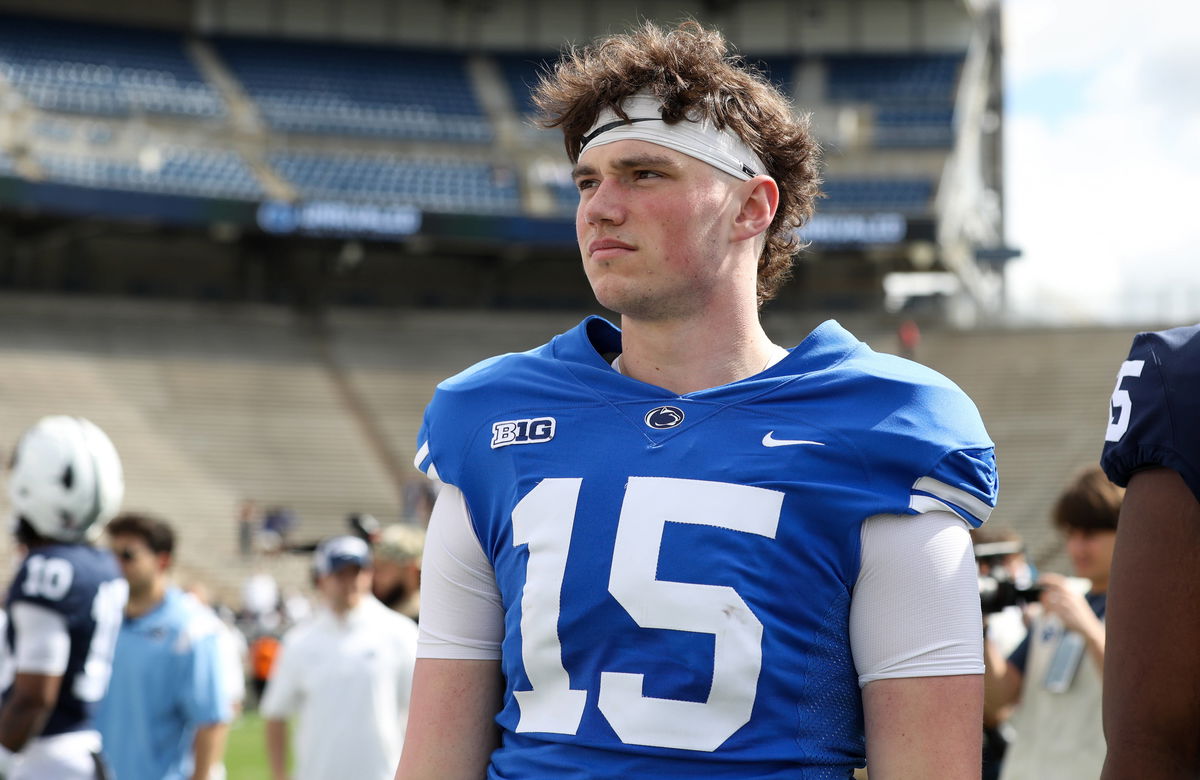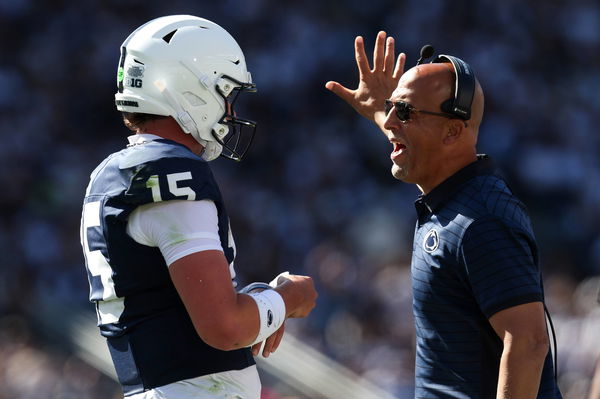
Imago
NCAA, College League, USA Football: Penn State Blue-White Spring Game Apr 26, 2025 University Park, PA, USA Penn State Nittany Lions quarterback Drew Allar 15 looks on following the Blue White spring game at Beaver Stadium. The White team defeated the Blue team 10-8. University Park Beaver Stadium PA USA, EDITORIAL USE ONLY PUBLICATIONxINxGERxSUIxAUTxONLY Copyright: xMatthewxO Harenx 20250426_lbm_bm2_036

Imago
NCAA, College League, USA Football: Penn State Blue-White Spring Game Apr 26, 2025 University Park, PA, USA Penn State Nittany Lions quarterback Drew Allar 15 looks on following the Blue White spring game at Beaver Stadium. The White team defeated the Blue team 10-8. University Park Beaver Stadium PA USA, EDITORIAL USE ONLY PUBLICATIONxINxGERxSUIxAUTxONLY Copyright: xMatthewxO Harenx 20250426_lbm_bm2_036
Penn State cruised to a solid 52-6 win over Villanova yesterday. But beneath the dominant scoreline, the Nittany Lions’ touchdown troubles lingered once again. The offense managed to rack up 465 total yards, with senior QB Drew Allar throwing for 209 yards and a touchdown. Nicholas Singleton and Kaytron Allen added strong runs to back him up. Yet the story in this game, and in this season so far, looks a bit different for the Nittany Lions. In the first half, Penn State twice reached the red zone only to settle for field goals by kicker Ryan Barker, highlighting an ongoing issue with closing out drives in the end zone. Drew Allar reflected on the game afterwards with an honest assessment.
Watch What’s Trending Now!
Barker’s consistency has been a bright spot amid offensive struggles. One memorable drive came late in the first half. It was a quick 70-yard touchdown drive in just 36 seconds, capped by a connection from Allar to Trebor Peña, but those moments haven’t been the norm. On several occasions, drives stalled just shy of the goal line, forcing Penn State to punt or kick field goals. And this pattern has repeated this season against teams like Nevada and FIU. Coach James Franklin has acknowledged this as a key concern. Especially with tougher Big Ten defenses looming. And if there’s one guy who wasn’t shy about owning these issues, it was Drew Allar in the post-game press conference.
When asked about the offense’s inability to cash in touchdowns, Drew was quick to dial in on the self-sabotage happening on the field when he said, “I think it’s just a combination of self-inflicting wounds. There are a couple of times where they kind of got in on some pressures because I kind of messed up the protection for the O line and a five-man pro,” Allar said.
ADVERTISEMENT
“So, there was just stuff that we can fix better as players and go out and execute better that will help us just score more touchdowns rather than settling for field goals,” the QB further elaborated. The takeaway here is simple: poor protection leads to pressure, pressure leads to chaos, and chaos leads to stalled drives.

Imago
NCAA, College League, USA Football: Fiesta Bowl-Penn State at Boise State Dec 31, 2024 Glendale, AZ, USA Penn State Nittany Lions quarterback Drew Allar 15 practices before the Fiesta Bowl against the Boise State Broncos at State Farm Stadium. Glendale State Farm Stadium AZ USA, EDITORIAL USE ONLY PUBLICATIONxINxGERxSUIxAUTxONLY Copyright: xMarkxJ.xRebilasx 20241231_mcd_su5_2
Penn State’s offense had the momentum but couldn’t capitalize in the red zone. The offensive line couldn’t hold their blocks long enough for Allar to connect with some of his talented targets like Trebor Peña or Luke Reynolds. To break it down, Penn State’s red zone struggles come from two main angles.
ADVERTISEMENT
One, the offensive line hasn’t been able to keep pressure off Allar in tight spaces, leading to rushed throws or forced decisions. And that’s exactly how it went. Allar missed some easy throws early, and worse, he missed on key downs that could’ve kept drives alive. Honestly, if he connects on a few of those red zone looks, Penn State probably hangs 70 in this game.
Most of the struggles came in the first half, where he had three straight incompletions that killed drives, two of them on third down. And the worst part? He started 0-for-5 on third downs. He did show some flashes, though. In the two-minute drill, he finally found his rhythm and hit his best throw of the day — a touchdown to Pena. The problem? That was about the only time he looked in sync and kept the offense moving.
ADVERTISEMENT
Penn State’s red zone troubles didn’t just pop up against Villanova. They actually have been dogging them all season, including in their matchup with Nevada. “I thought our run game, especially our outside zone stuff, could have been better,” James Franklin said. “But yeah, we stalled out there. Now, exactly why? I don’t have that answer for you right now.”
And let’s not forget the FIU game on September 6. That Week 2 matchup against FIU was a grind more than a blowout. The offense looked sloppy and uncoordinated, especially on third downs. They converted just three of 12 attempts—a dismal 25-percent clip that left fans biting their nails. The run game, which had flashes against Nevada, seemed stuck in slow motion, gaining only seven yards on third-down attempts.
The Nittany Lions went 2-for-4 on fourth down, but the inability to consistently get off the field or keep drives going stunted momentum. All in all, the three games were a reminder that Penn State’s offense still has work to do to finish drives, especially near the goal line.
ADVERTISEMENT
The woes don’t really end at the red zone
It’s not just the red-zone issues. Against Villanova, the running game also showed some glaring hiccups, which kept the offense from truly clicking. One of the major problems was timing and execution upfront. The blocking schemes just weren’t clicking, and that left the runners with no real room to work, killing plays before they even had a shot. Penn State’s running back duo came through again, racking up 170 yards and three touchdowns on 30 carries.

Imago
NCAA, College League, USA Football: Nevada at Penn State Aug 30, 2025 University Park, Pennsylvania, USA Penn State Nittany Lions head coach James Franklin talks with quarterback Drew Allar 15 during the first quarter against the Nevada Wolf Pack at Beaver Stadium. University Park Beaver Stadium Pennsylvania USA, EDITORIAL USE ONLY PUBLICATIONxINxGERxSUIxAUTxONLY Copyright: xMatthewxO Harenx 20250830_szo_bm2_0251
James Franklin wanted Nick Singleton to cut loose as the lead back. But through two games, he’d only piled up 92 yards, and against the Wildcats, it looked about the same. Singleton got 20 carries, found the end zone twice, but still only managed 85 yards. The burst and tackle-breaking we’re used to seeing from him just weren’t there, and he barely had any chances to flash that breakaway speed.
ADVERTISEMENT
Yeah, Kaytron Allen only got 10 carries, but man, he made them count. He averaged 8.6 yards a pop compared to Singleton’s 4.2. And honestly, credit the O-line too. They’ve been moving bodies and opening up huge lanes, giving the backs plenty of room to roll. Penn State eventually wore down Northwestern’s front, but the fact that it took that long was a little concerning.
Top Stories
LIV Golf Braces for Another Possible Exit in Wake of Brooks Koepka Departure

Sean Payton Announces Retirement Plans as Broncos HC Demands Improvement From Bo Nix & Co. Before Playoffs

Greg Biffle’s $4M Prized Possession Goes Up for Sale After Tragic Crash, Leaving NASCAR Fans Heartbroken

Biff Poggi All But Confirms Bryce Underwood’s Michigan Future After Announcing His Own Departure

‘Fighting for His Life’: ESPN Confirms Kirk Herbstreit’s Silent Struggles at College GameDay

Rory McIlroy Makes Feelings Clear on Bryson DeChambeau’s PGA Tour Return: ‘Have Lost…’

ADVERTISEMENT
ADVERTISEMENT
ADVERTISEMENT

